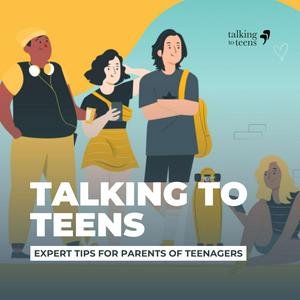Ep 339: Ending Imposter Syndrome for Teens
Richard Orbé-Austin, author of Your Child's Greatness, discusses imposter syndrome, perfectionism, boundaries, and how parents can empower teens to build true resilience and self-confidence.Full Show NotesAs parents, we want the best for our teenagers. We hope they'll be successful academically, thrive socially, and embrace the opportunities ahead. But lurking beneath the surface for many adolescents—and adults—is the pervasive doubt called imposter syndrome: the haunting fear of being revealed as a fraud, not belonging, or never being good enough. Surprisingly common, imposter syndrome can emerge quietly and lead our teens toward patterns of perfectionism, people-pleasing, anxiety, and even deeper stress.But how can parents recognize the signs of imposter feelings in their kids? And more importantly, how do we help teens develop the resilience, confidence, and realistic self-image that protect them against its harmful effects?To unravel these questions, we're joined by Dr. Richard Orbé-Austin, psychologist and co-author of Your Child's Greatness. An expert on imposter syndrome, Richard understands how these subtle feelings of doubt can sometimes quietly shape a person's identity, often beginning at a young age. He provides practical, down-to-earth strategies parents can use to nurture healthier mindsets in teens, helping them genuinely own their strengths while managing the anxieties involved in growth and change.Understanding Teen Imposter SyndromeRichard first helps us understand exactly what imposter syndrome means. Though not an official mental health disorder, "Imposter Syndrome" describes the chronic feeling that your success is undeserved or accidental, despite evidence to the contrary. As Richard explains, it often surfaces in perfectionist individuals who strive for an elusive, unrealistically perfect "ideal self" and become critical of their actual self. It's common among high-achievers, causing them to attribute their success to luck or external factors instead of their own abilities.In our discussion, he describes three common roles teens pick up early on—the "smart one," the "hardworking one," and the "survivor"—and how over-identifying with any one role can contribute to imposter feelings. He helps parents recognize subtle symptoms of these thoughts, like negative labeling, comparing themselves unfairly to others, and anxious attempts to predict future failure.Breaking Boundaries for True Self-WorthOne critical contributor to imposter syndrome, according to Richard, is a family environment lacking clear, healthy boundaries. Teenagers who grow up believing their sole purpose is pleasing their parents, coaches, or teachers often develop intense feelings of inadequacy, as they never feel truly good enough. They’re likely to overwork, avoid conflict, and suppress their own emotional experiences.Richard emphasizes the importance of empowering teenagers with strong personal boundaries. We discuss how parents can foster open dialogues with their kids about emotional and interpersonal boundaries, especially in competitive environments like youth sports, debate, or other activities. By teaching teens to stand up for themselves and express their needs, parents help them build independence, resilience, and authentic self-esteem.Tackling Perfectionism Through Growth MindsetsPerfectionism and imposter syndrome go hand-in-hand, as teens may see mistakes and failures as signs of inadequacy rather than natural parts of learning and growth. Richard shares meaningful ways to help adolescents redefine success and embrace the process of incremental improvement.We explore strategies for shifting teens from a rigid, achievement-focused perspective to a more flexible, growth-oriented one. For instance, Richard describes how reframing poor grades or performance anxiety as opportunities to learn, not signals of failure, can reduce teens' fear of taking healthy risks. He also discusses how parents' language around mistakes, success, and failure profoundly shapes their kids' attitudes toward personal growth.Parent Imposter Syndrome—Yours Counts Too!Interestingly, Richard notes that imposter syndrome doesn't stop with teens. Many parents also struggle with their own "idealized" parenting role and feelings of inadequacy around parenting decisions, mistakes, or imperfection. Parents who struggle with their own imposter thoughts can unintentionally pass down that sense of self-doubt to their children.Throughout our conversation, Richard provides affirming reassurance for parents facing these challenges. He stresses that no parent is perfect, that mistakes are inevitable, and that a willingness to form deeper self-awareness and gentler inner dialogue helps parents model genuine confidence for their teens. Being open about our own experiences with imposter syndrome and showing teens we too have growing to do can create healthier mindsets within the whole family.In the Episode….This impactful conversation with Richard is full of thoughtful, practical tips parents can put into practice immediately. On top of the topics discussed above, we also cover:Signs your teen is developing performance anxietyWays to challenge automatic negative thoughts ("ANTs")Differences between ideal and actual selves—and why they matterHow social anxiety or school bullying can fuel imposter syndromeStrategies to reduce people-pleasing tendencies and conflict avoidance If you'd like to learn more from Richard, check out his book, Your Child's Greatness, available now from major booksellers and independent bookstores. Thanks for listening! Don't forget to share and subscribe, and we'll see you next week.

